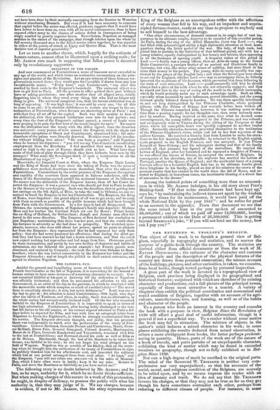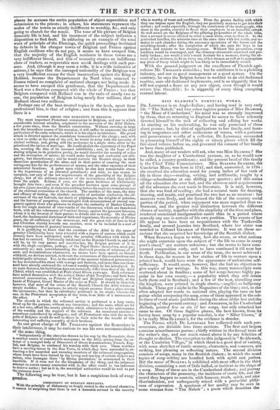THE REVEREND W. TROLLOPE ' S BELGIUM.
THE object of this work is to furnish a general view of Bel- gium, especially in topography and statistics, and to answer the purpose of a guide-book through the country. The statistics are derived either from official documents or from the work of M. ZAVIER HEUSCHLING ; the estimate of the character and customs of the people and the description of the physical features of the country are drawn from personal observation ; the minute account of the buildings, pictures, and other curiosities, is taken, we conceive, from local books, though tested perhaps by personal inspection.
A great part of the work is devoted to a topographical view of Belgium, each province being displayed in its geographical and historical features; conjoined with which are sketches of its existing character and productions, and a full picture of the principal towns, especially of those most attractive to a tourist. A variety of chapters then exhibit the political constitution and economical and social condition of Belgium, together with an account of its agri- culture, manufactures; arts, and learning, as well as of the habits and character of the people.
To a person who feels an interest in the country and consults the book with a purpose in view, Belgium Since the Revolution of 1830 will afford a good deal of useful information, though in a general if not a superficial way. To a reader without some motive the book may fail in attraction. The mixture of objects in the author's mind induces a mixed character in his work; in some places exhibiting the results deduced from actual observation, in others a mere abridgment from books, the latter perhaps predomi- nating in quantity. Hence, parts of the work are of the nature of a book of travels and parts partake of an encyclopaedic character, exhibiting the kind of matter which may be found in extended treatises on geography, though not so fully exhibited as in Bel- gium. Since 1830. Nor can a high degree of merit be ascribed to the original parts. The mind of the Reverend W. TEOLLOPE is neither very com- prehensive nor very unprejudiced ; so that his accounts of the social, moral, and religious condition of the Belgians, are scarcely to be relied upon, and by no means impress the reader with an idea of mastery and truth. We do not say that Mr. TROLLOPS invents his charges, or that they may not be true so far as they go; though his facts sometimes contradict each other, perhaps from referring to different classes of people. For instance, in some places he accuses the entire population of abject superstition and submission to the priests ; in others, his statements represent the males of the towns as utterly indifferent to worship, &c., and only going to church for the music. The tone of his picture of Belgian domestic life is bad, and his treatment of the subject indicates a disposition to find fault. In adducing as an example of the total want of principle of the Flemings, the quick proceedings instituted by debtors in the cheaper towns of Belgium and France against English creditors who do not pav, it seems to have escaped him, that the majority of the English residents in these towns are a very indifferent brood, and this of necessity creates an indifferent class of traders, as respectable men avoid dealings with such per- sons. And, (though it may seem a trifle, it is a trifle indicative of animus,) he says that the outraged nationality of the Belgians was a very insufficient excuse for their insurrection against the King of Rolland, because the Departement du Nord when annexed to France raised no complaint of national changes not being made. It seems to have escaped this gentleman, that the Departement du Nord was a fraction compared with the whole of France ; but that Belgium compared with Holland was in the ratio of nearly two to one, the population of Belgium being nearly four millions, that of Holland about two millions.
Perhaps one of the best-treated topics in the book, apart from professional bias, is that of religion ; and from this it appears that there is a
SCHISM AMONG THE ROMANISTS IN BELGIUM. •
The most important Protestant communion in Belgium, and one to which considerable interest attaches, originated in the secession of the Abbe Helsen,' a few years since, from the Romish communion. Without entering at large into the immediate causes of his secession, it will suffice to enumerate the chief particulars of the cults refortnee, which it is his object to introduce. His grand
attack is directed against the scandalous immoralities of the clergy ; and, with a view to strike at the root of the evil, he would do away with the necessity of clerical celibacy, and,giving. still the preference to a single state, allow to the priesthood the option of marriage. He would abolish the supremacy of the Papal see, scouting the idea of its assumed infallibility ; and, in the hope of re- storing religion to its primitive purity, he would interdict the worship of relics and the invocation of saints; he would make fasting and confession not obli- gatory, but discretionary ; and he would restrain the Romish clergy in their shameless prostitution of the altar, and in their power of exacting the most outrageous fees for the performances of masses, and the other exercises of their
ministerial functions. A point upon which he also lays considerable stress, is the importance of an educated priesthood: and truly he has reason to complain, not only of the low acquirements of the generality of the Belgian clergy, but of the ordinary character of the instructions which they deliver
from the pulpit. Seldom, if ever, are the great doctrines of Christianity brought into view ; and even if the preacher ventures upon some precept of
his own jejune morality, it sinks into nothing before the supreme momentousness of the external ceremonies of the church. The sacrifice of the mass, the duty and efficacy of fasting, the absolute necessity of auricular confession, the ob- servance of the set festivals, the merit of pilgrimages, the delights of paradise,
and the horrors of purgatory, intermingled with denunciations of eternal ven- geance against those who presume to dispute the authority of Mother Church, form the staple material of nine-tenths of the discourses, which are thundered forth, with all the vehemence of fanatical frenzy, against the ignorant listeners, whom it is the interest of their pastors to delude and to terrify. On the other hand, the fundamental doctrines of faith and repentance, the necessity of Divine grace, the all-sufficiency-of the atonement, and the great rule of love to God and Christian charity towards one another, seem to be included hi a sort of index expurgatorius of pastoral instruction.
It is gratifying to know that the exertions of the Abbe in the cause of genuine Christianity have been attended with a degree of success which could scarcely have been anticipated under the peculiar difficulties with which he has had to contend. Universally intolerant as the Romig'. Church is, and ever will be, by its very nature and constitution, the Belgian portion of it is,
with the single exception, perhaps, of the Papal States themselves, most pre- eminently so; and, notwithstanding the chartered promise of tolerance of all sects and denominations whatsoever, no means have been spared, no threats
withheld, no devices untried, to thwart the endeavours of this conscientious and indefatigable reformer. Yet, in the midst of the severest trials and persecutions, he has maintained his stand with courage and decision, and more than ten thou- sand have already embraced the reformed worship which he has introduced. In its main features, his institution does not materially differ from that of the Abbe Chdtel, which was established at Paris about fifteen years ago. Both reformers have united themselves with the revived Order of the Templars; and both have received consecration, as Primate of Gaul and Belgium respectively, at the bands of Palaprat, Grand Master of the order at Paris. It should be observed, however, that some of the errors of the Romish Church the Abbe retains or simply modifies. For instance, he utterly rejects penance from a place among the sacraments ; but then he substitutes penitence in its stead ; whereas the one, in the Protestant acceptation of the term, is as little of a sacrament as
the other. * • • • The church in which the reformed service is performed is a long room, fitted up for the purpose, without any decoration - and the seats, which are let at a low rate afford the scanty pittance which administers to the maintenance of the worship and the support of the reformer. An occasional aumone is sometimes contributed by strangers ; and all Protestants who visit the metro- polis of Belgium would do well to throw in their mite for the benefit of this interesting and suffering assembly of their brethren. As one great charge of Mr. TROLLOPS against the Romanists is their intolerance, it may be curious to see his own recommendation of the same thing. " Independently of the obstacles thrown in his way by the Romanists, there is another source of considerable annoyance to the Abbe, arising from the at- tempt of a mongrel body of Dissenters of divers denominations, French, Eng- lish, and Belgian, to confound his worship with their own. These worthies have a meeting-house in the Rue Verte, to which they have succeeded in at- tracting a few unsettled and wavering members of the reformed congregation, whose heads have been turned by the raving and ranting of certain tinkers and tailors, who harangue there by Divine permission,' as announced in their handbills. If it were not for the blasphemy of the thing, and the infamous attempt to extort money connected with it, the affair would be too ludicrous to deserve notice ; but as it is, the municipal authorities would do well to put the nuisance down."
The following may be true, but it has a suspicious look of exag- geration.
DISHONESTY OF BELGIAN SERVANTS.
With the principle of dishonesty so deeply rooted in the national character, it cannot be surprising that there is not a domestic servant in the country who is worthy of trust and confidence. From the greater facility with which they can impose upon the English, they are peculiarly anxious to get into their service; and cooks especially, through the connivance of the tradespeople, who share in the profits, contrive to fleece their employers to an incredible extent. So well aware are the Belgians of the pilfering propensities of the whole tribe, that a servant is never allowed to enter a room alone, even to clean it. In the genteelest families, the mistress rises at the same time with ber maids, and re- mains in each chamber during the necessary operations of the broom and the scrubbing-brush ; after the completion of which she puts the keys in her pocket, and returns to her dressing-room. Without this precaution, every workbox would be rummaged, and the chimney-ornaments examined and pro- bably broken ; nor would a lady's-maid hesitate for a moment, during the ab- sence of her mistress, to fit on every one of her dresses, as well as to appropriate any piece of finery which might be less likely to be immediately missed.
With the general judgment on the excellence of Flemish agri- culture Mr. Tacnadare coincides ; but he attributes it to a plodding industry, and not to good management or a good system. On the contrary, he says the Belgian farmer is wedded to an old-fashioned routine, uses old-fashioned implements, and is so niggardly that he will not expend a franc on any new object, even though it would return him threefold : he is niggardly of every thing excepting manual labour.



























 Previous page
Previous page